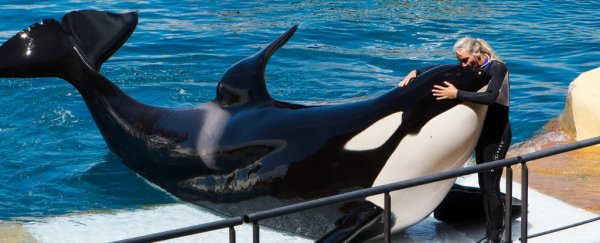A captive orca named Wikie has become the first killer whale known to recognisably make sounds that are not part of her native repertoire - including human language words like "hello" and "bye bye".
An international team of researchers has just published a study demonstrating the talking abilities of 14-year-old Wikie, who lives at Marineland Aquarium in Antibes, France.
Orcas are remarkably intelligent ocean mammals, which makes them deadly to their prey and, in one rare and special case, collaborative hunters with humans.
It also makes them a popular marine park attraction since they can be trained, although this practice is highly controversial, since orcas are very social animals.
They live their lives in family groups called pods, and marine park captivity removes them from that natural environment and forces the animals into relationships with strangers.
This seems especially cruel when you consider that orca pods each have their own dialects - so much so that scientists are able to distinguish between pods just by listening to the calls.
But, as a stunning case described in 2014 demonstrated, they're also capable of learning new "dialects" when needed, even across species.
When housed with bottlenose dolphins for a period of three years, three orcas' vocalisations changed to more closely match those of the dolphins, including dolphin vocalisations such as click trains and whistles.
The star of this latest study, Wikie had already been trained to respond to a "copy" command as part of previous research into imitative learning in orcas.
Using this command, an international team of researchers have now taught Wikie to blow raspberries, mimic a creaky door, say hello and bye bye, and repeat numbers, all with her head above water.
This is the first time an orca has been trained to learn and distinctly repeat human sounds.
Previously, only three other mammals have been described doing so - an elephant in 2012 (video here), harbour seals in 1985, and a beluga whale in 2012 (you should listen here, it's hilarious and amazing).
A beluga whale has also been observed learning to "speak dolphin," in a case described just last year.
Wikie was a quick study. Using both live interactions and recordings, she usually learned to repeat a word, phrase or sound within 10 attempts.
She didn't always make perfect copies - as you can hear in the audio above - but the sounds were still recognisable, both by blinded independent assessors and by sound file analysis.
To be absolutely clear, there is no evidence that Wikie understood the sounds she was making.
But the research adds to a growing body of evidence that some cetaceans, and orcas in particular, are capable of changing their vocalisations in response to hearing new sounds in their environment. This reinforces the hypothesis that orca dialects indicate social learning.
"The results reported here show that killer whales have evolved the ability to control sound production and qualify as open-ended vocal learners," the researchers concluded.
"Moreover, given the highly derived state of the sound-producing apparatus uniquely evolved by cetaceans, the imitative capacities found in this study also underscore the fine-tuned ability of this species to flexibly produce accurate matches of heterospecific in-air sounds."
The research has been published in the journal Proceedings of the Royal Society B.
